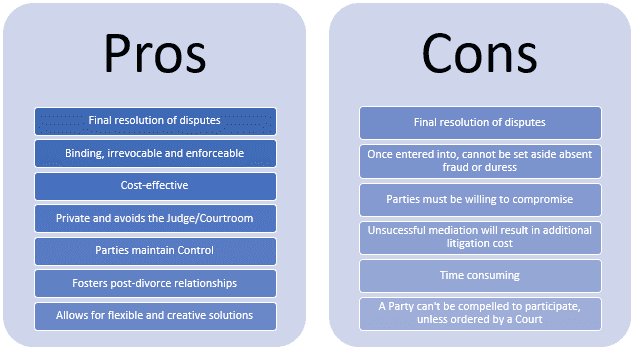
Mediated Settlement Agreements in Texas
What is a Mediated Settlement Agreement?
Mediation is an alternative dispute resolution process where parties go to solve their case outside of the courtroom. At mediation, two parties negotiate through a mediator, a third party who does not represent either party. When the parties reach a settlement agreement on their issues, they enter into a Mediated Settlement Agreement. A Mediated Settlement Agreement (or MSA for short) is the binding, final, and irrevocable contract parties to a lawsuit sign once they have settled their issues.
Why Should I Get a Mediated Settlement Agreement?
In most cases, mediation is a great way to resolve issues outside of the courtroom and without the court’s interference. At mediation, parties get to negotiate and build their own terms for agreement of their issues. Parties have complete control over the resolutions for their case, so long as they agree.
In the courtroom, a Judge is bound to follow the law. At mediation, parties can enter into agreements that differ from the law. Texas family courts do not have the ability to change a Mediated Settlement Agreement once it has been signed by all parties and their attorneys.
Pros and Cons of a Mediated Settlement Agreement
What Makes a Mediated Settlement Agreement Special?
Mediated Settlement Agreements in family law were created with the intent to honor party’s agreements. The Texas Legislature wants to honor agreements between parties and reward them for settling their disputes outside of Court. In doing so, the Texas Legislature makes a signed Mediated Settlement Agreement final, binding, and irrevocable. This means that once a Mediated Settlement Agreement is signed, the agreements contained therein are confirmed and set in stone. No additional agreements may be added, taken away or changed.
How Does a Mediated Settlement Agreement Differ From Other Agreements?
If parties enter into a settlement agreement that is not confirmed in a Mediated Settlement Agreement, the Court must look at the agreement with two eyes – a Procedural Eye and Legal Eye.
- Procedural Eye: The Procedural Eye ensures that the agreement makes sense, and that the language of the agreement is enforceable. If something needs clarified, the Procedural Eye allows the Court to make a revision for clarification purposes only, but the Court cannot change the terms of the agreement.
- Legal Eye: The Legal Eye ensures that the parties agreement conforms with the Texas Family Code. The Legal Eye considers if the parties’ agreements are in the Best Interest of the Child or are a Just and Right Division of property.
MSAs and the Procedural Eye
When parties enter into a Mediated Settlement Agreement, the Legal Eye is knocked out. The Court cannot look at the agreement with a Legal Eye. Why? Because the parties have decided, on their own, what is in the Best Interest of the Child or a Just and Right Division of their property. The Judge cannot change the agreements made in a Mediated Settlement Agreement. The Judge cannot add provisions to a Mediated Settlement Agreement. If a Mediated Settlement Agreement forgets a term or an agreement, there is no going back to add that agreement. It is incredibly important to read and re-read a Mediated Settlement Agreement before signing. It an agreement is omitted or wrongly stated, it cannot be fixed in the future.
How Do I Get a Mediated Settlement Agreement?
To obtain a Mediated Settlement Agreement, the parties must attend mediation. In a family law mediation, the parties are placed in separate rooms with their respective attorney. A mediator, a person who is a third party who does not represent either party to the lawsuit, goes back and forth between the two rooms to help the parties reach an agreement.
If the parties reach an agreement amongst themselves, their agreement is confirmed into writing. Thus, a Mediated Settlement Agreement is created. The Mediated Settlement Agreement contains all the terms of the parties’ agreements.
What Does a Mediated Settlement Agreement Contain?
In a divorce case, a Mediated Settlement Agreement will contain agreements for property division and children’s issues, if there were children born during the marriage. In a suit-affecting the parent-child relationship or a modification of the parent-child relationship, the Mediated Settlement Agreement will contain all agreements related to the children.
In family law cases, parties may enter a Temporary MSA or Final MSA. If a case is contested, parties will likely enter a Temporary MSA to provide them with orders during the pendency of the case. The agreements contained in a Temporary MSA last until a Final MSA is procured or until the Judge makes a final order at trial. If parties go to mediation and obtain a Final MSA, the agreement contained in the MSA resolves all the issues in the case.
What if I don’t Like my Mediated Settlement Agreement?
If you entered into a Mediated Settlement Agreement, it is almost impossible to get out of your agreement afterwards. The only times a party could back out of a Mediated Settlement Agreement is if there is fraud or duress. A Mediated Settlement Agreement can’t be set aside because a party no longer wishes to be bound by the terms or because a party wants to add more terms.
If you find yourself in this situation, you want to ensure that you contact a knowledgeable attorney to discuss your case.


Skilled Litigators & Counselors At Law
WHAT ELSE MAKES OUR FIRM UNIQUE?
-
Quick Response Time
You can almost always expect a call back in 24 hours, with most being returned the same day.
-
One-on-One AttentionYou can always count on receiving personalized attention from our small, boutique firm.
-
Compassionate & Honest
You'll get an attorney who is compassionate, receptive, and responsive to your needs.
-
Cost-Effective Firm
We utilize the latest technology to reduce costs, including access to an online client portal.
Testimonials
WHAT OUR CLIENTS SAID ABOUT US
-
"Responsive, Informative, and Caring"Mr. Hunt was responsive from the start, replying to my initial inquiry questions on a Sat/Sun. My case had urgency, and the staff got my case started right away. Brittany took time to explain the priority and timelines for information they needed from me.Tammy
-
"Top-notch professionalism and quality."Hunt Law Firm, PLLC is top-notch. I've used them for over 3 years and can't say enough about their professionalism and quality of work.Wyatt
-
"Patience, respect, and complete professionalism."I found a law firm that really cares! From the first call to set an appointment to the signing of my prepared estate planning documents, I was treated with patience, respect, and complete professionalism.Cherry
-
"Absolutely wonderful team."Hunt Law Firm, PLLC, is absolutely wonderful. I'll be recommending this amazing firm to everyone in the future.Rifath
-
"Working with the Hunt Law Firm made our estate preparation seamless."Right from the initial consultation meeting, to the final signing, the entire staff provided the needed support to accomplish our objectives.Kola
-
"Fantastic, friendly, and efficient service!"Fantastic, friendly, and efficient service! They did exactly what we needed in a very professional way. Would definitely recommend Hunt Law Firm, PLLC for estate planning.Fran








